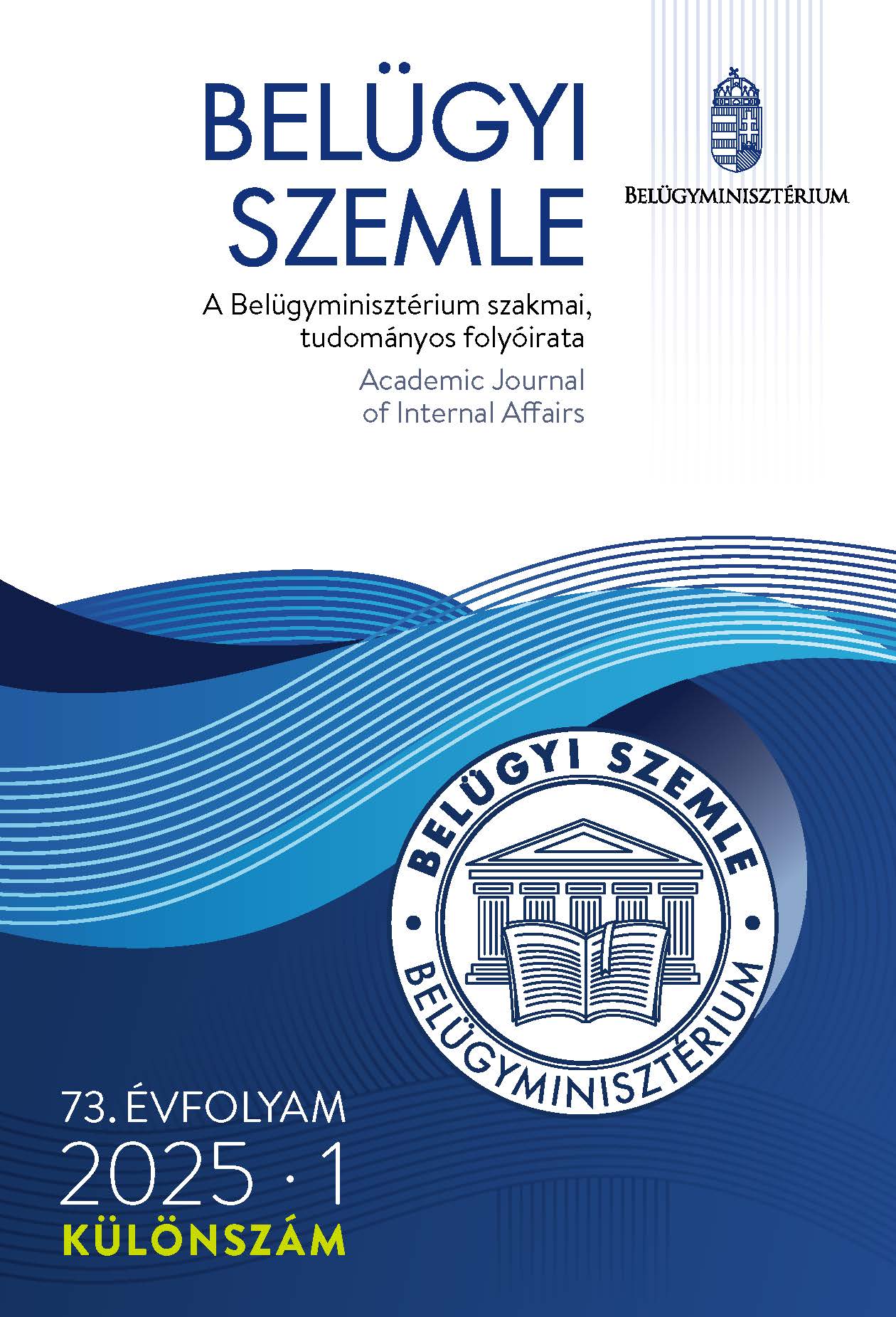Absztrakt
Aim: The Southeast European Law Enforcement Center (hereinafter: SELEC) is a centre for criminal cooperation between police forces and customs services of the Balkan and other neighbouring countries, including Hungary, primarily for the prevention and combating of serious and organised crime that may have a cross-border element or that is actually or presumably cross-border in nature. The main objective of the present study is to identify and isolate the main potential factors that could serve as motives for the National Tax and Customs Administration's Directorate General of Criminal Investigation (hereinafter: NTCA investigative authority) in its international criminal cooperation with the SELEC.
Methodology: Following the analysis of the secondary literature and the knowledge base of the good practice and work experience observed in the above-mentioned organisations, the main motivational factors corresponding to the study objectives were identified, isolated and further considered.
Findings: based on secondary research and the knowledge base of observed good practice and work experience, three factors - namely speed, accuracy and cost-effectiveness of information exchange - can be identified as the main motives for criminal cooperation between the NTCA investigative authority and the SELEC.
Value: If the findings of this study are accepted, it can be concluded that speed, accuracy and cost-effectiveness of information exchange may be the three main factors that motivate criminal cooperation between the NTCA investigative authority and the SELEC. Further reflection on the findings may suggest that the use of the Law Enforcement Centre's information channels may further assist in supporting both the strategic objectives of the NTCA investigative authority in particular. In order to take full advantage of the above, and particularly given the flexibility and efficiency of informal liaison, it would be worth considering the delegation of a permanent SELEC liaison officer from the NTCA Investigative Authority.
Hivatkozások
Blaskó, B., & Budaházi, Á. (2019). A nemzetközi bűnügyi együttműködés joga [The law of international cooperation in criminal matters]. Dialóg Campus.
Boda, J. (Ed.). (2019). Rendészettudományi szaklexikon [Law Enforcement Encyclopedia]. Dialóg Campus.
Csaba, Z. (2017). Felderítési információkon alapuló rendészet a nemzetközi akciók tapasztalatainak tükrében [Intelligence-led policing in the light of experience from international operations]. In Czene-Polgár, V., & Zsámbokiné Ficskovszky, Á. (Eds.), Mérföldkövek az adó- és vámigazgatás történetéből: Válogatott tanulmányok az évfordulók tükrében [Milestones in the history of tax and customs administration: Selected studies in the light of anniversaries] (pp. 139–153). Magyar Rendészettudományi Társaság Vám- és Pénzügyőri Tagozat.
Csaba, Z. (2018). A bűnelemzés aktuális kihívásai a nemzetközi súlyos és szervezett bűnözés elleni európai fellépés terén [Current challenges for crime analysis in the European fight against serious and organized crime]. Szakmai Szemle, 16(4), 118–132.
Csemáné, V. E., Görgényi, I., Gula, J., Horváth, T., Jacsó, J., Lévay, M., & Sántha, F. (2017). Magyar büntetőjog – általános rész. Digitális kiadás [Hungarian criminal law – General part. Digital edition]. Wolters Kluwer Kft. https://doi.org/10.55413/9789632956282
Dávid, L., Molnár, F., Bujdosó, Z., & Dereskey, A. (2007). Biztonság, terrorizmus, turizmus [Security, terrorism, tourism]. Gazdálkodás, 51(20), 160–166.
Deák, J., Nagy, I., & Csaba, Z. (2021). Együttműködés nemzetközi bűnüldöző szervezetekkel: orosz és magyar rendőrségi példák [Cooperation with international law enforcement organizations: Russian and Hungarian police examples]. Belügyi Szemle, 69(5), 851–867. https://doi.org/10.38146/BSZ.2021.5.8
Görgényi, I., Karsai, K., Madai, S., Tóth, M., Vaskuti, A., Fantoly, Zs., Farkas, Á., Herke, Cs., Kis, L., & Róth, E. (2016). Büntetőjogi fogalomtár. Digitális kiadás [Glossary of criminal law. Digital edition]. Wolters Kluwer Kft. https://doi.org/10.55413/9789632956169
Hegyaljai, M. (2023). Emlékezetes pillanatok az Interpol elmúlt harminc évéből [Memorable moments from the last thirty years of Interpol]. Belügyi Szemle, 71(11), 1927–1937. https://doi.org/10.38146/BSZ.2023.11.1
Nagy, J. (2014). Az uniós bűnügyi együttműködés tendenciái (út a jogsegélytől az Európai Ügyészségig és közös nyomozócsoportokig) [Trends in EU criminal cooperation (from mutual legal assistance to the European Public Prosecutor’s Office and joint investigation teams)]. In Ruzsonyi, P. (Ed.), Tendenciák és alapvetések a bűnügyi tudományok köréből [Trends and foundations in criminal sciences] (pp. 119–166). Nemzeti Közszolgálati és Tankönyv Kiadó Zrt.
Páhi, B. (2019). A nemzetközi bűnügyi együttműködés, különös tekintettel az Európai Közösség pénzügyi érdekeinek védelmére [International criminal cooperation with special regard to the protection of the European Community’s financial interests]. Miskolci Jogtudó, (1), 57–68.
Pallagi, I. (2022, June 23). SELEC szerepe a nemzetközi együttműködésben [The role of SELEC in international cooperation]. Presentation at the Professional Day on International Cooperation, Online Conference.
Schachter, S. (2020). About SELEC. Belügyi Szemle, 68(Spec. Issue 2), 145–148. https://doi.org/10.38146/BSZ.SPEC.2020.2.10
Szabó, A. (2012). A rendőrségi együttműködés jogi alapjai és intézményei [Legal foundations and institutions of police cooperation]. In Fülöp, P. (Ed.), Tavaszi Szél 2012 Konferencia: Konferenciakötet [Spring Wind 2012 Conference: Conference Proceedings] (pp. 702–709). Doktoranduszok Országos Szövetsége.
Szabó, B. (2018). Nemzetközi bűnügyi együttműködés a regionális integráció fejlődése során [International criminal cooperation during the development of regional integration]. Magyar Rendészet, 18(3), 163–177. https://doi.org/10.32577/mr.2018.3.11
Szendrei, F. (2019). Bűnügyi együttműködés [Criminal cooperation]. In Nyeste, P., & Szendrei, F. (Eds.), A bűnügyi hírszerzés kézikönyve [Handbook of criminal intelligence] (pp. 221–242). Dialóg Campus Kiadó.

This work is licensed under a Creative Commons Attribution-NonCommercial-NoDerivatives 4.0 International License.
Copyright (c) 2025 Belügyi Szemle
